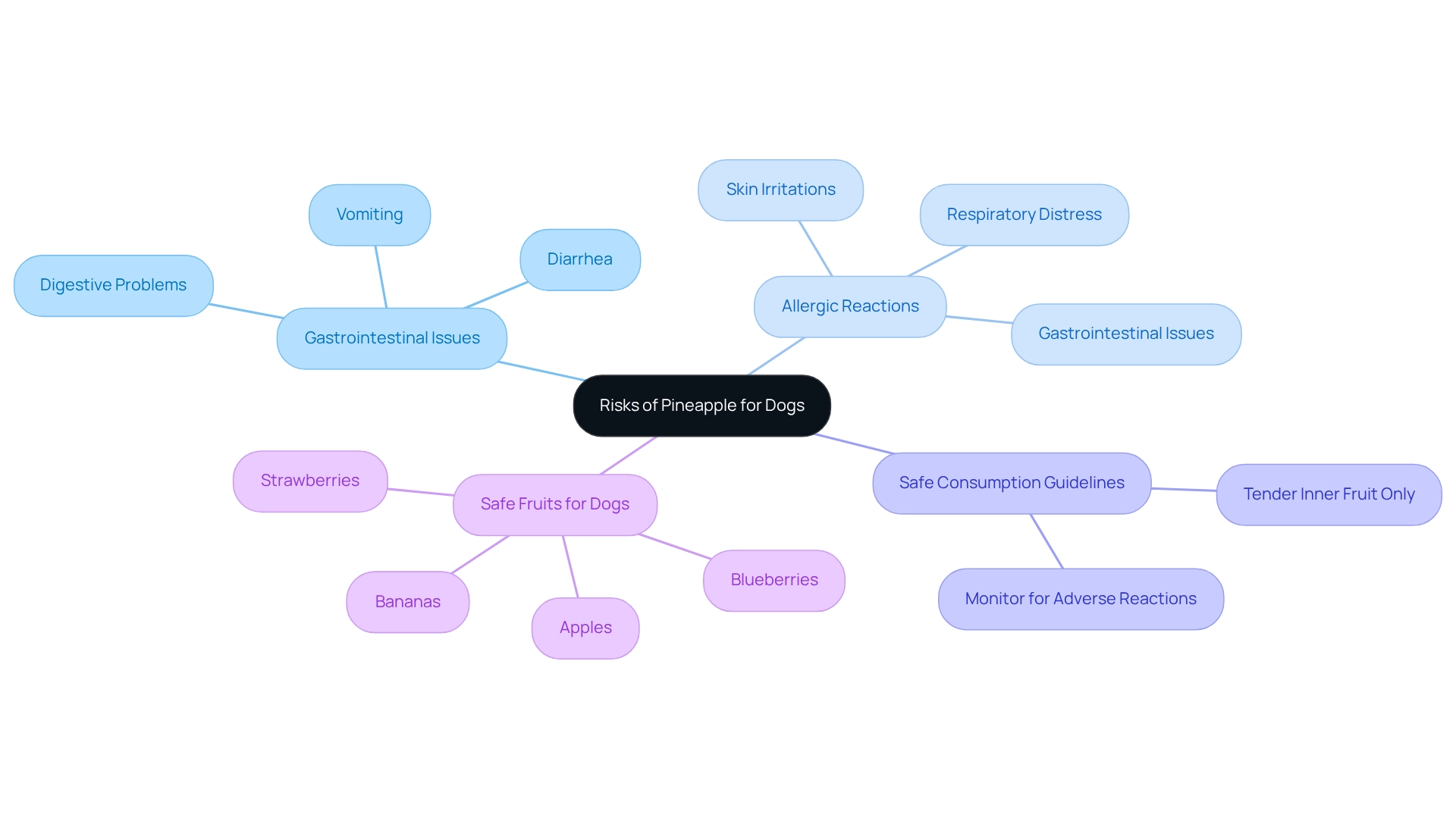

Is Pineapple OK for Dogs? Understanding Benefits and Risks
by Lena Park
Last updated: July 10, 2025
Verified and Approved by:
Angela Morris,
MSW, LCSW
Fact Checked

Overview
Pineapple can be a safe and nutritious treat for dogs when prepared with care and offered in moderation. It provides valuable nutrients such as vitamin C, manganese, and dietary fiber, which can support your dog’s health. However, it’s important to be cautious—avoid canned varieties due to added sugars, and always remove the tough skin and core to prevent any choking hazards.
Additionally, keep an eye out for any adverse reactions, especially if your furry friend has a sensitive stomach. Your dog’s well-being is paramount, and being mindful of these details can ensure they enjoy this tasty fruit safely.
Introduction
In the journey to find healthy and enjoyable treats for our beloved dogs, pineapple often stands out as a delightful option. This tropical fruit is not only delicious but also rich in essential nutrients that can positively impact canine health. Yet, as caring dog owners, we must be mindful of the complexities involved in safely introducing pineapple into our pets’ diets.
- Moderation and proper preparation are vital to avoid any potential health risks.
- By exploring the nutritional benefits it provides and the necessary precautions to prevent adverse reactions, we can enhance our dogs’ well-being while making mealtime an exciting experience.
Assess Safety: Can Dogs Eat Pineapple?
Yes, dogs can enjoy that fruit, but it’s truly important to ensure that pineapple is ok for dogs and to consume it in moderation. When prepared properly, raw tropical fruit is a safe and nutritious treat, and pineapple is ok for dogs.
It’s essential to steer clear of canned fruit, as it often contains added sugars and preservatives that can harm your dog’s health. Fresh-squeezed fruit juice can be offered in limited amounts—typically just 1 or 2 tablespoons—but should be avoided if it comes from canned or bottled sources due to high sugar content.
Additionally, the tough outer skin and core of the fruit should be excluded, as they pose choking hazards and may lead to digestive blockages. Always serve fresh fruit that is peeled and cut into small, manageable pieces to minimize choking risks and aid digestion.
Veterinarians recommend consulting with an expert to identify the best dietary options for your dog, ensuring that any new treat aligns with their wellness needs. As freelance writer Victoria Lynn Arnold wisely notes, “Contact your veterinarian to find out if this applies to your dog and what the best next steps would be.”
It’s also important to clarify that there is no solid evidence suggesting that pineapple ok for dogs can effectively deter pets from consuming feces, a common misconception. Always prioritize your dog’s wellness and well-being when introducing new foods.
Explore Health Benefits: Nutritional Value of Pineapple for Dogs
Pineapple, which is often considered ok for dogs, is a wonderful, nutrient-rich fruit that brings several advantages for our beloved pets. It is particularly rich in vitamin C, a vital nutrient that helps strengthen the immune system and enhances overall well-being. This powerful antioxidant not only aids in fighting off infections but also promotes skin health and supports the healing process. Additionally, pineapple serves as an excellent source of manganese, a mineral essential for bone development and metabolic functions, contributing to a dog’s overall vitality.
This delightful fruit also provides a significant amount of dietary fiber, which is beneficial for digestion. Fiber plays a key role in regulating bowel movements and can help prevent constipation, making pineapple a great choice for maintaining gastrointestinal health. Furthermore, this tropical gem contains bromelain, an enzyme celebrated for its anti-inflammatory properties, which may help reduce inflammation and improve digestive efficiency.
When considering if pineapple is ok for dogs, it’s important to add it to their diet in moderation. Consulting with a veterinarian before introducing any human foods, including fruit, is highly recommended to ensure your furry friend’s safety and well-being. As Jo Jones aptly puts it, “This is the best plant-based dog food by far.” Overall, the nutritional profile of pineapple makes it a valuable addition to a dog’s diet, provided it is offered appropriately and thoughtfully.
Identify Risks: When Pineapple Can Be Harmful to Dogs
While pineapple is often considered a healthy treat, it’s important to understand if pineapple is ok for dogs, as it can pose several risks for our beloved canine companions. Its high sugar content may lead to gastrointestinal upset, including diarrhea and vomiting, particularly when consumed in large quantities. Additionally, the elevated fiber level in this fruit can result in digestive problems for dogs, complicating their dietary needs. For those dogs with sensitive stomachs or those prone to pancreatitis, caution is advised, as pineapple ok for dogs might cause heartburn or digestive discomfort due to its acidity. It’s important to note that only the tender inner fruit is safe for dogs to eat, which confirms that pineapple is ok for dogs while avoiding the tougher outer skin and core.
Some dogs may also experience allergic reactions to certain fruits, which can manifest as skin irritations, gastrointestinal issues, or even respiratory distress. A case study titled “Signs of Pineapple Allergies in Dogs” underscores the importance of recognizing and addressing these reactions promptly. Monitoring your dog for any adverse reactions after introducing pineapple into their diet is essential. If concerning symptoms arise, consulting a veterinarian is vital to ensure your pet’s well-being.
For a balanced perspective, it’s worth mentioning that other types of produce, such as:
- Apples
- Bananas
- Blueberries
- Strawberries
can be safely enjoyed by dogs and offer various wellness benefits. As Dr. Hunter Finn, an integrative veterinary expert, emphasizes, understanding the risks associated with specific fruits is crucial for maintaining your dog’s digestive health. Remember, your furry friend’s health and happiness are our top priority, and being informed is the first step to ensuring their well-being.

Guide Feeding Practices: How to Safely Serve Pineapple to Dogs
To ensure that pineapple is ok for dogs, please follow these caring guidelines when serving this fruit:
- Always choose fresh options, avoiding canned varieties that may contain added sugars or preservatives.
- Start by peeling the fruit and removing the tough core, as these parts can pose a choking hazard or lead to digestive issues.
- Slice the fruit into small, bite-sized pieces to further reduce the risk of choking.
- Introduce pineapple ok for dogs gradually by offering a small amount initially, and observe your dog closely for any signs of digestive upset.
Pineapple should only make up a minor portion of your dog’s overall diet—ideally no more than 10% of their daily caloric intake. If your dog enjoys the taste and shows no adverse reactions, then pineapple ok for dogs can be offered as an occasional treat, especially during warmer months when it serves as a refreshing snack.
As Ellen Malmanger, DVM, wisely notes, “There are many types of produce that are beneficial for dogs,” highlighting the vital nutrients and antioxidants they provide. However, it’s important to steer clear of snacks made from produce, as they tend to be high in sugar and are best avoided.
By adhering to these best practices, you can ensure that your furry companion safely enjoys the benefits of pineapple, which is ok for dogs, while maintaining a balanced diet. In summary, always prioritize fresh fruit, monitor your dog’s reactions, and keep treats like pineapple to a minimum for optimal health.

Conclusion
Exploring pineapple as a treat for dogs reveals that this delightful tropical fruit can indeed be a nutritious addition to a canine diet when introduced with care. Its rich vitamin C content supports the immune system, while manganese and dietary fiber contribute to overall health and digestive well-being. However, it’s important to remember that moderation is crucial; excessive consumption can lead to gastrointestinal upset due to the fruit’s high sugar and fiber content.
Prioritizing safety when serving pineapple to dogs is essential. Fresh pineapple should be prepared correctly—peeled, cored, and cut into small pieces—to minimize choking hazards. Close monitoring for any adverse reactions is vital, especially for dogs with sensitive stomachs or potential allergies. Consulting with a veterinarian before introducing pineapple is strongly recommended to ensure that it aligns with a dog’s individual health needs.
Ultimately, while pineapple can offer several health benefits, it should only be provided as an occasional treat within a balanced diet. By adhering to proper feeding practices and being mindful of potential risks, dog owners can enhance their pets’ mealtime experiences while promoting their overall health and well-being.
Frequently Asked Questions
Can dogs eat pineapple?
Yes, dogs can enjoy pineapple, but it should be given in moderation and prepared properly.
What types of pineapple should be avoided for dogs?
Canned pineapple should be avoided as it often contains added sugars and preservatives that can harm your dog’s health.
Is fresh-squeezed pineapple juice safe for dogs?
Fresh-squeezed pineapple juice can be offered in limited amounts, typically just 1 or 2 tablespoons, but should be avoided if it comes from canned or bottled sources due to high sugar content.
How should pineapple be prepared for dogs?
Pineapple should be peeled and cut into small, manageable pieces to minimize choking risks and aid digestion. The tough outer skin and core should be excluded.
Should I consult a veterinarian before giving pineapple to my dog?
Yes, it is recommended to consult with a veterinarian to identify the best dietary options for your dog and ensure any new treat aligns with their wellness needs.
Can pineapple help deter dogs from eating feces?
There is no solid evidence suggesting that pineapple can effectively deter dogs from consuming feces, which is a common misconception.
What should be prioritized when introducing new foods to my dog?
Always prioritize your dog’s wellness and well-being when introducing new foods.
Certify Your Emotional Support Animal Today

Why You Can Rely on Us?
At Wellness Wag, we believe your pet deserves care rooted in both science and compassion. Each article is carefully researched, written in clear language for pet owners, and then reviewed by qualified professionals to ensure the information is evidence-based, current, and practical for real-life care. Our goal is to help you feel confident in making informed decisions about your pet’s health and well-being.
Reviewed by
Angela Morris, MSW, LCSW
Angela is a licensed clinical social worker with 20 years of experience in patient advocacy and community mental health. She has assisted numerous clients with ESA evaluations and brings a deep understanding of disability accommodations, ensuring that all information is accurate, supportive, and practical.

Written by :
Lena Park
Last Updated :
July 10, 2025












